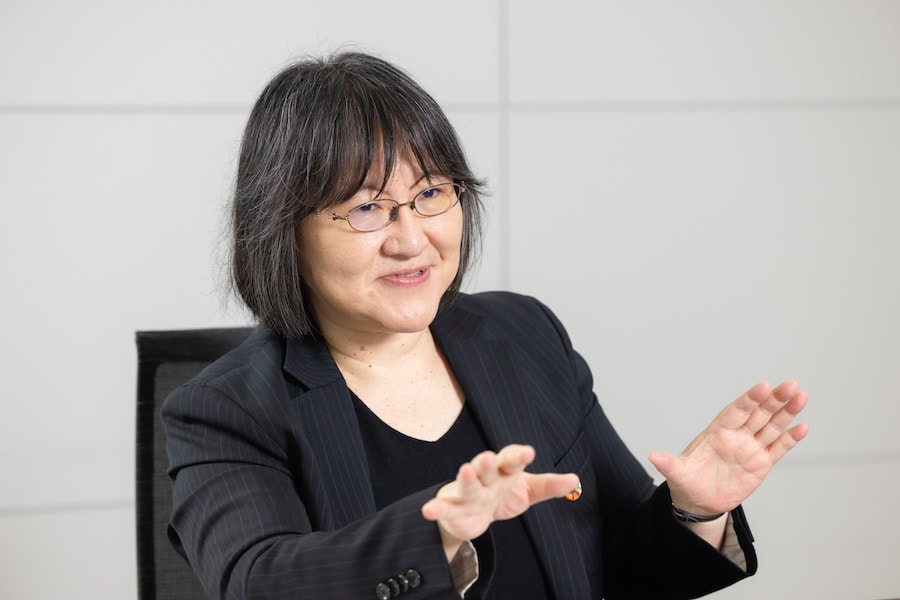Professor at the University of Tokyo Institute for Future Initiatives specializing in international and environmental law. Graduated from Kyoto University Law School and has taught at several institutions, including Nagoya University Graduate School, before starting her current position. Research mainly focuses on legal issues related to international environmental treaties and law policies concerning climate change and energy. Has written and edited several books, including Kankyokisei no gendaiteki tenkai (“Development of Modern-day Environmental Regulations”) and Kikohendoseisaku no dainamizumu (“Dynamism of Climate Change Policies”).
Movement toward a Decarbonized Society as an Opportunity for New Business: What Actions for Climate Change Should Corporations Take?

In recent years, torrential rain, flooding, heat waves, and other abnormal weather events have been increasing worldwide. Many people are now starting to directly experience the risks of climate change. Actions that can be taken to counteract climate change involve the realization of a decarbonized society that achieves net zero emissions of greenhouse gases. To make this a reality, not only governments but also corporations have to take meaningful action.
So what response is expected of corporations to combat the problem of climate change? With the 26th Conference of the Parties (COP26) to the United Nations Framework Convention on Climate Change (UNFCCC) to be held soon in the UK, we talked to Professor Yukari Takamura of the University of Tokyo Institute for Future Initiatives.
Abnormal weather events that everyone is experiencing
--What is the current situation with climate change globally?
Takamura: Abnormal weather events both in Japan and globally have been increasingly appearing in the news. Recently, there have been weather-related disasters that no one could have imagined, such as severe flooding in Germany and Belgium. I think that everyone is noticing significant changes in the climate.
The Intergovernmental Panel on Climate Change (IPCC) published their latest assessment report in August 2021. The global average temperature has already increased to approximately 1.1°C above pre-industrial levels, and this is predicted to increase to more than 1.5°C above pre-industrial levels within the next 20 years. Furthermore, to limit the increase in temperature to a low level, we must cut greenhouse gases as much as we can.
--I’ve heard that climate change is contributing to an increase in not only weather-related disasters but the spread of viruses as well.
Takamura: While the source of the current COVID-19 pandemic still needs to be discovered, even before the pandemic started, ecological studies noted that there is a correlation between the deterioration of the environment/ecosystems and infectious diseases.
From the start of the 20th century, more than 200 viruses that infect humans have been discovered. It is believed that viruses that used to exist in nature and that did not have any contact with humans have now begun appearing in human society through infection from wild animals due to deforestation and other human activities, along with the destruction of ecosystems, as a result of climate change.

Important points to note for climate change action
--What measures are being taken globally to tackle climate change?
Takamura: Europe, the U.S., Japan, and other major advanced nations are aiming to become carbon neutral (net-zero greenhouse gas emissions) by 2050. This is an ambitious goal that corresponds to the 1.5°C target in the Paris Agreement adopted in 2015. Advanced nations are incorporating climate change action into efforts to economically recover from the damage caused by the COVID-19 pandemic in order to achieve carbon neutrality.
Three measures are shared by most countries. The first one involves energy decarbonization, the transition to clean energy, and the building of the infrastructure needed to achieve this.
The second one is the decarbonization of mobility. Let me give you an example. By 2035, for new vehicles sold, the EU is considering allowing only the sale of vehicles that do not emit CO2. Each country is looking into the construction of hydrogen and charging stations, along with other infrastructure that enables this goal.
And the third measure is the decarbonization of buildings and houses. European nations and the U.S. are focusing on transforming existing structures into Net Zero Energy buildings.
--What action is Japan taking to tackle climate change?
Takamura: A draft of the central government’s 6th Strategic Energy Plan and measures to counteract global warming based on that draft were created in August 2021. In Japan’s case, approximately 85% of all greenhouse gas emissions stem from the use of energy, so Japan must decarbonize its energy system. Simply put, the maximum implementation of renewable energy is the major challenge that Japan faces.
As of 2019, renewable energy accounted for about 18% of Japan’s power composition. In the draft I mentioned earlier, the plan is to increase that to between 36% and 38% by 2030. Japan is aiming to generate a total of about 60% of its electricity from decarbonized power sources, which includes Japan’s existing nuclear power plants. Setting an ambitious target attracts private businesses and investment and draws on all policies to meet the target.
--How important will it be regarding to what degree greenhouse gas emissions can be limited by 2030?
Takamura: The latest assessment report published by the IPCC outlines five scenarios for the future of society in accordance with different amounts of greenhouse gas emissions. The report predicts that the greater the emissions, the more the temperature will rise. To limit temperature rise as much as possible, humans must emit as few greenhouse gases as possible into the atmosphere from now. Thus, the fast transition to low global emissions is absolutely vital.
Therefore, there are two keys to corporate climate change actions: One is reducing emissions as much as possible via existing technology as a short-term goal, and the other is moving forward with initiatives as part of a mid- to long-term strategy in order to decarbonize social infrastructure.
Houses being built today will undoubtedly still be standing in 2050, and any new power plants built will still be in operation beyond 2050. Thus, decisions to implement new infrastructure and investment must conform to “2050 carbon neutrality.”
Company executives will have to ensure that future business and investment decisions conform to mid- to long-term decarbonization goals. This will force many company business portfolios to change.

Climate change risks and information disclosure
--What sort of actions should companies take to address the threat of climate change?
Takamura: Companies are also analyzing what impact climate change will have on business and management, and they are incorporating mid- to long-term measures into their plans as business risks. If things stay as they are now, the negative impact from abnormal weather and other climate change-related events will further worsen. Moreover, if society and the market drastically shift to carbon neutrality, this will impact company assets and business.
For instance, if companies that handle fossil fuels, such as oil and coal, do not foresee changes to society and markets as they move toward a decarbonized society and gradually change their business portfolios, their earnings will drop. Companies must comprehensively analyze this risk and explain their strategies to address this risk.
Some countries have already started to enact laws to mandate information disclosure related to climate change risks. Even in Japan, one of the conditions for companies to be listed on the “Prime Market” that will begin in April 2022 on the Tokyo Stock Exchange is to disclose risks related to climate change. This is an extremely important change for companies doing business in the global market.
--I believe that there’s an initiative for companies to cut not only their own emissions of greenhouse gases but also to manage and cut emissions across the supply chain, including vendor emissions.
Takamura: Yes, that’s correct. That initiative is growing. For example, when large U.S. tech companies select suppliers, they ask potential suppliers to submit their greenhouse gas emissions across the supply chain and value chain, and they use that as selection criteria.
Hitachi also has a goal of carbon neutrality across its entire value chain by FY2050 in addition to making its plants and offices carbon neutral by FY2030.
There is also a full-scale financial initiative. Financial institutions and institutional investors have set a goal of making their investment and loan portfolios carbon neutral by 2050. Financial institutions that provide capital to companies have set a goal that the beneficiaries of this investment must transition to zero emissions of greenhouse gases. Companies have embarked on these initiatives, and efforts to cut emissions by companies are gathering steam.

Transition to a decarbonized society: A new business opportunity
--What should companies be conscious of when striving to both expand business and decarbonize?
Takamura: I think that companies need a business strategy that addresses markets that will change as the world transitions to a decarbonized society. It is critical that companies treat climate change as a risk and respond accordingly. However, market changes will also create opportunities to develop new business. Some companies will have to significantly alter their current business model, which will be difficult, but I would like them to take advantage of this significant shift.
--What can ordinary people do as individuals?
Takamura: Our lives are dependent on the products and services provided by companies. It is therefore extremely important to contribute to climate change action through production selection. By choosing products and services that have low emissions, we can support companies that are rigorously addressing climate change.
And if you have some money to spare, investing in those companies is also useful. Undoubtedly this is the time for consumers and companies to collaborate. While carbon neutrality is a challenge for governments and companies, it is a challenge that we all must tackle as well.
Yukari Takamura



